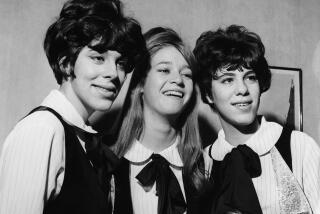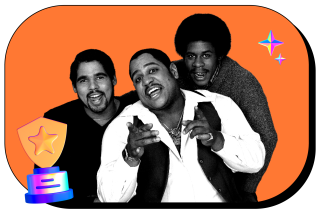The Stranglers: Facing a Blackout of Inspiration and Identity
- Share via
SAN JUAN CAPISTRANO — Sugar Ray Leonard looked so dismal in his comeback attempt against Hector Camacho earlier this month that it tarnished some golden memories. Hard-core fans of the Stranglers must have experienced something like that at the Coach House on Friday night, when the veteran British band staggered and stumbled.
There was no electricity in the air at the half-empty club; no past glories were recaptured by the quintet’s problematic retro-rock.
In the late 1970s and early ‘80s, the Stranglers never really took off Stateside but found a receptive audience in Europe for their mix of perky pop songs and snarling, punkish barbs.
But since 1991, when singer-songwriter-guitarist Hugh Cornwell left, a revamped lineup (with Paul Roberts on vocals, John Ellis on lead guitar, keyboard player Dave Greenfield, bassist J.J. Burnel and drummer Jet Black) has been paddling upstream in search of an identity.
The band’s last two albums, “Stranglers in the Night” in 1993 and last year’s “About Time,” caused barely a ripple with the critics or the crowds. Maybe that’s why all but three of the 20 songs Friday came from before 1987.
*
Roberts brought an exuberant stage presence to the proceedings. A visually exciting focal point, he spun, darted, lurched and sank to his knees over the course of the 90 minutes. But he wasn’t enough to carry the show. The Stranglers’ material and musicianship just didn’t warrant his level of enthusiasm.
For every good song, there were two or three inferior ones. During a number called “Sinister,” when Roberts sang, “You got a needle in your eyeball / see the blood run down,” it was more laughable than scary.
The set was marred further by technical glitches, including buzzing amps and a murky mix.
The show opened with sets by two bands from Costa Mesa that took contrasting approaches.
The Globe’s kitschy synth-pop emphasized Vegas-style flash and frills with prerecorded TV themes, glitter-and-leather outfits, hula hoops and a go-go dancer. It was mildly entertaining, especially during “Chupacabra,” the rousing, dance-inducing finale.
But Niki Smart left a deeper, more lasting impression.
Playing original songs that ranged from folky, contemplative musings to harder-edged pop-rock, the South Africa native emerged as a promising singer-songwriter who doesn’t need gimmicks to connect with an audience.
She and her four-man band were at their best during “Free Again,” about desperate domesticity; “Absolutely Famous,” about snobbery; and “All the Way,” a study of sexual indignity.
More to Read
The biggest entertainment stories
Get our big stories about Hollywood, film, television, music, arts, culture and more right in your inbox as soon as they publish.
You may occasionally receive promotional content from the Los Angeles Times.










